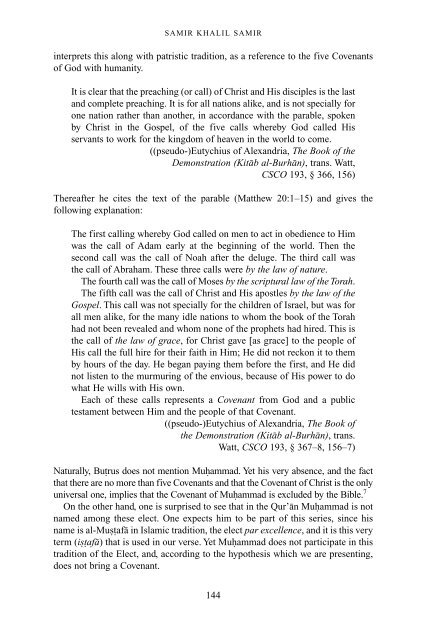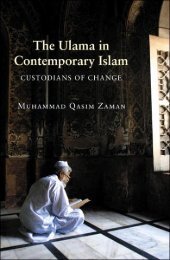The Qur'an in its historical context (pdf - Islam and Christian-Muslim ...
The Qur'an in its historical context (pdf - Islam and Christian-Muslim ...
The Qur'an in its historical context (pdf - Islam and Christian-Muslim ...
You also want an ePaper? Increase the reach of your titles
YUMPU automatically turns print PDFs into web optimized ePapers that Google loves.
SAMIR KHALIL SAMIR<br />
<strong>in</strong>terprets this along with patristic tradition, as a reference to the five Covenants<br />
of God with humanity.<br />
It is clear that the preach<strong>in</strong>g (or call) of Christ <strong>and</strong> His disciples is the last<br />
<strong>and</strong> complete preach<strong>in</strong>g. It is for all nations alike, <strong>and</strong> is not specially for<br />
one nation rather than another, <strong>in</strong> accordance with the parable, spoken<br />
by Christ <strong>in</strong> the Gospel, of the five calls whereby God called His<br />
servants to work for the k<strong>in</strong>gdom of heaven <strong>in</strong> the world to come.<br />
((pseudo-)Eutychius of Alex<strong>and</strong>ria, <strong>The</strong> Book of the<br />
Demonstration (Kitab al-Burhan), trans. Watt,<br />
CSCO 193, § 366, 156)<br />
<strong>The</strong>reafter he cites the text of the parable (Matthew 20:1–15) <strong>and</strong> gives the<br />
follow<strong>in</strong>g explanation:<br />
<strong>The</strong> first call<strong>in</strong>g whereby God called on men to act <strong>in</strong> obedience to Him<br />
was the call of Adam early at the beg<strong>in</strong>n<strong>in</strong>g of the world. <strong>The</strong>n the<br />
second call was the call of Noah after the deluge. <strong>The</strong> third call was<br />
the call of Abraham. <strong>The</strong>se three calls were by the law of nature.<br />
<strong>The</strong> fourth call was the call of Moses by the scriptural law of the Torah.<br />
<strong>The</strong> fifth call was the call of Christ <strong>and</strong> His apostles by the law of the<br />
Gospel. This call was not specially for the children of Israel, but was for<br />
all men alike, for the many idle nations to whom the book of the Torah<br />
had not been revealed <strong>and</strong> whom none of the prophets had hired. This is<br />
the call of the law of grace, for Christ gave [as grace] to the people of<br />
His call the full hire for their faith <strong>in</strong> Him; He did not reckon it to them<br />
by hours of the day. He began pay<strong>in</strong>g them before the first, <strong>and</strong> He did<br />
not listen to the murmur<strong>in</strong>g of the envious, because of His power to do<br />
what He wills with His own.<br />
Each of these calls represents a Covenant from God <strong>and</strong> a public<br />
testament between Him <strong>and</strong> the people of that Covenant.<br />
((pseudo-)Eutychius of Alex<strong>and</strong>ria, <strong>The</strong> Book of<br />
the Demonstration (Kitab al-Burhan), trans.<br />
Watt, CSCO 193, § 367–8, 156–7)<br />
Naturally, Butrus does not mention Muhammad. Yet his very absence, <strong>and</strong> the fact<br />
that there are no more than five Covenants <strong>and</strong> that the Covenant of Christ is the only<br />
universal one, implies that the Covenant of Muhammad is excluded by the Bible. 7<br />
On the other h<strong>and</strong>, one is surprised to see that <strong>in</strong> the Qur’an Muhammad is not<br />
named among these elect. One expects him to be part of this series, s<strong>in</strong>ce his<br />
name is al-Mustafa <strong>in</strong> <strong>Islam</strong>ic tradition, the elect par excellence, <strong>and</strong> it is this very<br />
term (istafa) that is used <strong>in</strong> our verse. Yet Muhammad does not participate <strong>in</strong> this<br />
tradition of the Elect, <strong>and</strong>, accord<strong>in</strong>g to the hypothesis which we are present<strong>in</strong>g,<br />
does not br<strong>in</strong>g a Covenant.<br />
144



